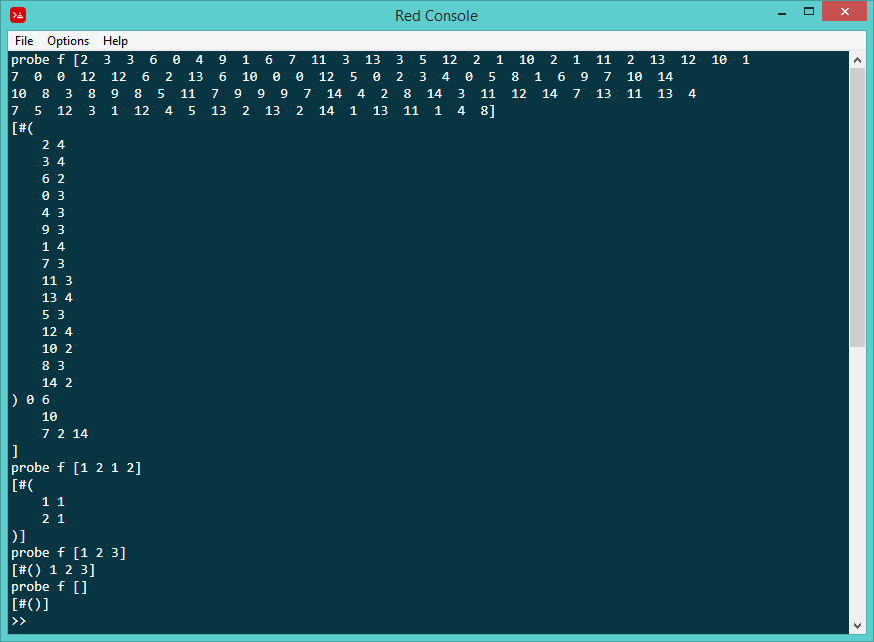Disclaimer: This challenge inspired by me trying to find pairs in a large pile of socks.
Disclaimer: This is looking for a very different process and output to Help me sort my socks!. Please don't claim it as a duplicate until you've read both ;)
So, I have a huge pile of socks. Of course I keep them categorized by compatibility number. Compatible socks, which I can wear together, have the same number. (Of course, every programmer does this).
My super-convenient plot device quickly scans the pile and outputs an array of compatibility numbers for the pile. It looks a bit like this:
[2, 3, 3, 6, 0, 4, 9, 1, 6, 7, 11, 3, 13, 3,
5, 12, 2, 1, 10, 2, 1, 11, 2, 13, 12, 10, 1,
7, 0, 0, 12, 12, 6, 2, 13, 6, 10, 0, 0, 12,
5, 0, 2, 3, 4, 0, 5, 8, 1, 6, 9, 7, 10, 14,
10, 8, 3, 8, 9, 8, 5, 11, 7, 9, 9, 9, 7, 14,
4, 2, 8, 14, 3, 11, 12, 14, 7, 13, 11, 13, 4,
7, 5, 12, 3, 1, 12, 4, 5, 13, 2, 13, 2, 14, 1,
13, 11, 1, 4, 8]
That's good data, but it's about as much use to me as scanning the pile myself by eye. What I want to know is how many compatible pairs I need to look for, and which are going to be 'odds', which I can discard for now.
In the above example, I am looking for these pairs of socks:
{3=>4, 6=>2, 2=>4, 1=>4, 11=>3, 13=>4, 12=>4, 10=>2, 7=>3, 0=>3, 5=>3, 4=>3, 9=>3, 8=>3, 14=>2}
(4 pairs of number 3, 2 pairs of number 6 etc.)
And these numbers will have 'odd ones out'. When I've found all the pairs for these, I can discard the last one.
[0, 6, 10, 7, 2, 14]
The challenge
- Convert a list of compatible numbers to a count of pairs for each number and an array of 'odds'.
- The pairs will be composed of a data structure (hash, or other) showing how many pairs can be made of each compatibility number (can be skipped if no pairs can be made).
- The odds will be composed of a list of numbers which occur and odd number of times in the array.
- The order of the outputs is not significant.
- The size of my sock pile can, of course, be arbitrarily large.
The Rules
- It's golf, make it short.
- No standard loopholes.
- Use any language you like.
- Please include a link to an online interpreter.
Test Cases
Input: [1, 2, 2, 3, 3, 3, 4, 4, 4, 4, 5, 5, 5, 5, 5]
Output:
Pairs: {2=>1, 3=>1, 4=>2, 5=>2}
Odds: [1, 3, 5]
Input: [2, 3, 3, 6, 0, 4, 9, 1, 6, 7, 11, 3, 13, 3, 5, 12, 2, 1, 10, 2, 1, 11, 2, 13, 12, 10, 1, 7, 0, 0, 12, 12, 6, 2, 13, 6, 10, 0, 0, 12, 5, 0, 2, 3, 4, 0, 5, 8, 1, 6, 9, 7, 10, 14, 10, 8, 3, 8, 9, 8, 5, 11, 7, 9, 9, 9, 7, 14, 4, 2, 8, 14, 3, 11, 12, 14, 7, 13, 11, 13, 4, 7, 5, 12, 3, 1, 12, 4, 5, 13, 2, 13, 2, 14, 1, 13, 11, 1, 4, 8]
Output:
Pairs: {3=>4, 6=>2, 2=>4, 1=>4, 11=>3, 13=>4, 12=>4, 10=>2, 7=>3, 0=>3, 5=>3, 4=>3, 9=>3, 8=>3, 14=>2}
Odds: [0, 6, 10, 7, 2, 14]
Input: [1, 2, 1, 2]
Output:
Pairs: {1=>1, 2=>1}
Odds: []
Input: [1,2,3]
Output:
Pairs {}
Odds: [1,2,3]
Input: []
Output:
Pairs: {}
Odds: []

